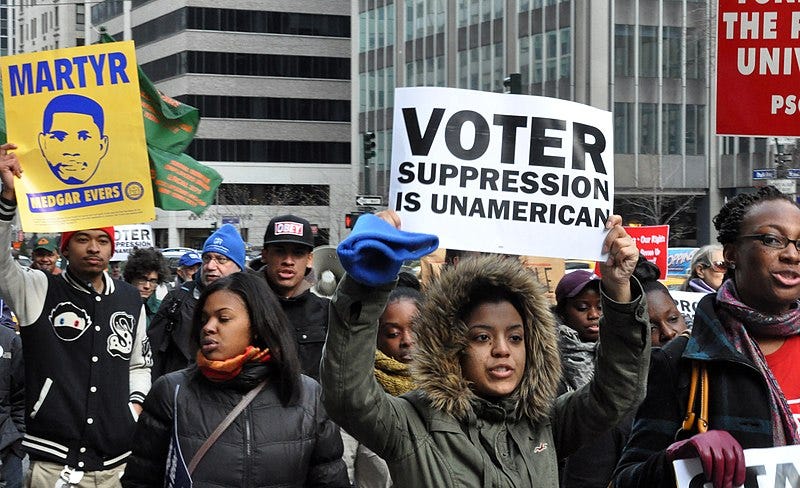|
Voter suppression is a strategy used to influence the outcome of an election by discouraging or preventing specific groups of people from voting. Voter suppression is an anti-democratic tactic associated with authoritarianism. African Americans are the primary target of voter suppression in the United States. Voter suppression has been practiced in the United States since at least the end of Reconstruction (1865–77). After Reconstruction, African Americans living in the former Confederate States were briefly able to exercise their newly won rights to vote; to run for local, state, and federal offices; and to serve on juries. The Fourteenth (1868) and Fifteenth (1870) Amendments to the U.S. Constitution, along with a series of laws passed between 1866 and 1875, attempted to extend to all American men (yes, “men”) the liberties and rights granted by the Bill of Rights. The Fifteenth Amendment specifically prohibited restricting or denying the right to vote on the basis of race. In 1867, nearly three years before the passage of the Fifteenth Amendment, Congress passed the Military Reconstruction Act, which brought the vote to Black men in ten former Confederate states. The first year Black men were able to participate in federal elections was 1868. Despite enormous obstacles and violent opposition, by 1868 more than eighty percent of Black men who were eligible to vote had registered. Relying on federal protection, African American voters elected hundreds of Black state representatives and several Black U.S. representatives and senators during Reconstruction. While voter suppression tactics existed during Reconstruction, they increased exponentially after the end of Reconstruction. The tactics of voter suppression range from changes that make voting more confusing or time-intensive, to intimidating or harming prospective voters. One of the most effective ways of suppressing votes is refusing to hold elections. A rare and shocking example of voter suppressionI recently learned about a small town in Alabama that has not held a public election for more than sixty years. The town is Newbern, Alabama. While nearly eighty-five percent of the town residents are Black, before 2020 the town never had a Black mayor. One reason Newbern had never had a Black mayor is because residents of Newbern have been prevented from voting for mayor. The office of mayor has simply been handed down from one white man to another. Born and raised in Newbern, eighty-three-year-old Hattie Hollis could not recall a single election being held. “Not that I know of,” she told Tread’s Lee Hedgepeth. “I can’t remember any election.”  Hattie Hollis stands on her porch in Newbern (Photo courtesy of Lee Hedgepeth) James Ballard, seventy-six years old, could only remember two former mayors: Robert Walthall, who served as mayor for forty-four years, and Paul Owens, who served on the council for thirty-three years and mayor for eleven. According to Ballard, At one point, we didn’t even know who the mayor was. If you knew somebody and you was white, and your grandfather was in office when he died or got sick, he passed it on down to the grandson or son, and it’s been that way throughout the history of Newbern.
Newbern’s history is deeply rooted in slavery. Incorporated in 1854 as demand for land to produce cotton soared, the town of Newbern quickly developed into an economy dominated by plantations where enslaved Black people were forced to grow and harvest cotton. In 2020, a Black volunteer firefighter named Patrick Braxton challenged the practice in Newbern of handing down the office of mayor. Braxton told Capital B News that he was fed up with officials’ indifference to the community’s needs — especially the majority-white council’s failure to provide disinfectant, masks, humidifiers, and other critical supplies to at-risk residents during the Covid-19 pandemic. As a volunteer firefighter, Braxton has witnessed repeated refusals and failures to respond to emergency calls involving Black residents. At least one refusal resulted in the death of a Black woman that could have been prevented had Braxton been allowed access to the fire station’s automated external defibrillator (AED).  Patrick Braxton after becoming the first Black mayor of Newbern, Alabama in 2020. (Photo courtesy of Aallyah Wright/Capital B) When Mr. Braxton told the incumbent mayor, Haywood “Woody” Stokes III, that he intended to run for his seat, Mr. Stokes told him, “We’ve never had an election out here. We don’t have ballots and machines to do it.” Stokes became mayor in 2008, when he inherited the position from Haywood Stokes Jr. Their ancestor, Peter P. Stokes, served in the Confederate Army and “owned” enslaved Black people when Newbern was a cotton plantation town.  Former Newbern Mayor Woody Stokes ( Facebook) Mr. Braxton called the Alabama Conference of Black Mayors, which told him how and where to file the necessary qualifying paperwork. He followed their instructions, and because no one else — including Haywood Stokes — filed the paperwork to qualify for the office, Mr. Braxton became Newbern’s first mayor on July 22, 2020. After “winning,” Braxton appointed both Black and White members of the city council. There had only ever been one Black city council member prior. According to reporting from Capital B News, the former mayor, and the former council members held a “secret meeting” to conduct a “special elgg GBg as candidates.” After the special election that no one knew about, Stokes and the former council, all but one of whom are white, reappointed themselves. For the last three years, Braxton has been engaged in a federal civil rights lawsuit alleging the white former mayor and city council members violated the Constitution when they locked him out of the Town Hall, preventing him from fulfilling the office of mayor that he legally obtained. According to State Sen. Bobby Singleton, the Minority Leader in the Alabama Senate, “Braxton is the mayor.” Singleton believes the effort to oust Braxton is motivated by race. Singleton asserts, It’s just been the old, powerful slavehands that was on Black folks’ neck in that community. That mentality is still there.
A far more common example of voter suppressionWhile what is happening in Newbern may be rare and somewhat unusual, tactics to suppress Black voting and Black power aren’t, especially across the South. In efforts to maintain white supremacy, “the South has been resistant to all types of changes” said Emmitt Riley III, associate professor of political science and Africana Studies at The University of the South. Regarding the Newbern incident, Riley asserts, This is a clear case of white [people] attempting to seize and maintain political power in the face of someone who went through the appropriate steps to qualify and to run for office and by default wins because no one else qualified. This raises a number of questions about democracy and a free and fair system of governance.
When Riley asserts “This raises a number of questions about democracy,” he is referring specifically to the American system of “representative democracy.” Representative democracy is a form of democracy in which people vote for “representatives” who then vote on policy initiatives and pass laws on behalf of the people. Representative democracy differs from “direct democracy,” a form of democracy in which people vote on policy initiatives directly. In order for representative democracy to work, the political system has to ensure fair representation. While the practice of denying elections for decades is rare and extreme, Alabama has a long history of a far more common practice of denying fair representation — gerrymandering. Gerrymandering is the political manipulation of electoral district boundaries with the intent to create an undue advantage for a party, group, or socioeconomic class within the constituency. On July 21, 2023, the Republican-led legislature in Alabama approved a new congressional map that lowers the percentage of Black voters in a majority-Black district and allocates a forty percent Black voting population to another district. The action defied a federal court order affirmed by the U.S. Supreme Court in June requiring Alabama to draw congressional districts that fairly represents the black population of Alabama. In June, the Supreme Court ruled that legislators in Alabama had drawn districts that unlawfully dilute the political power of its Black residents, in violation of the Voting Rights Act. While Black people make up more than a quarter of the state’s population, six of the state’s seven districts are currently majority white. The Supreme Court upheld a lower court’s order that Alabama needed to redraw the congressional map so it includes two districts in which “Black voters either comprise a voting-age majority or something quite close.” The Alabama legislature’s outright defiance of the SCOTUS ruling is reflective of a long history of Black voter suppression in Alabama. In response, Minority Leader Bobby Singleton declared, You just ignore us, throw something in our face and just say Black folks don’t need to vote in this state. That’s what you’re telling me. “We don’t care about your voice.” That’s what it ultimately is … that only White men and White women should have a voice in this state. That is sad.
While this recent action of the Alabama legislature is indeed sad, it is consistent with Alabama’s history, a history that includes the 1901 Alabama Constitutional Convention where convention chair John Knox said the convention’s goal was “to establish white supremacy in this state.” This was at a time when Black residents made up roughly forty-five percent of the state’s population. Sadly, that constitution is still in place. As Americans prepare for Presidential primaries and a general election in 2024, we all need to be diligent in our opposition to voter suppression and in our support of policies, practices, and legislation that promote representative democracy.
|



